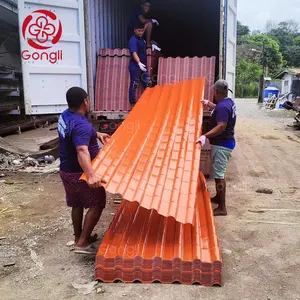
Uv Coating Waterproof Spc Flooring Tile 4mm 5mm 6mm Plastic Material Click Lock Lvt Pvc Vinyl Plank Flooring


Durable Peel And Stick PVC LVT Flooring Tiles Waterproof Vinyl Floor Sticker Dry Back Peel And Stick PVC LVT Flooring Tiles























PVC resin roof tiles represent a significant segment within the roofing materials market, offering a blend of durability and aesthetic appeal. These tiles are crafted from a robust polymer known as PVC (polyvinyl chloride), which ensures longevity and resistance to various climatic conditions. The versatility of PVC roofing solutions makes them suitable for a wide range of architectural styles, from traditional to contemporary.
There are several types of PVC roof tiles available, each with unique characteristics. Some mimic the appearance of traditional clay or concrete tiles, while others offer a more modern look. Features such as UV resistance, fire retardancy, and low thermal conductivity are inherent in these tiles, making them a practical choice for roofing. The lightweight nature of PVC tiles also allows for easier and faster installation compared to their heavier counterparts.
The application of PVC resin roof tiles is diverse, covering residential, commercial, and industrial buildings. Their adaptability means they can be installed on a variety of roof pitches, catering to different architectural demands. The suitability of these tiles extends to regions with variable weather patterns, as they are designed to withstand heavy rains, strong winds, and prolonged sun exposure without significant degradation.
PVC resin roof tiles are composed of eco-friendly materials that contribute to sustainability. The production process of these tiles often involves recycled PVC, reducing the environmental impact. Additionally, the end-of-life recyclability of these tiles further underscores their eco-conscious credentials.
The advantages of using PVC resin roof tiles are manifold. Their resistance to chemical erosion makes them ideal for areas prone to acid rain or industrial emissions. The inherent flexibility of PVC also means these tiles can endure structural movements better than rigid materials, reducing the risk of cracking. Furthermore, the maintenance requirements for PVC roofing are minimal, contributing to a lower total cost of ownership over the lifespan of the roof.
Selecting the appropriate PVC resin roof tile involves considering factors such as climatic conditions, building design, and personal aesthetic preferences. With a broad spectrum of designs and finishes, PVC tiles can cater to a variety of tastes and functional requirements. It is essential to assess the specifications of each tile type to ensure the best fit for a particular roofing project.